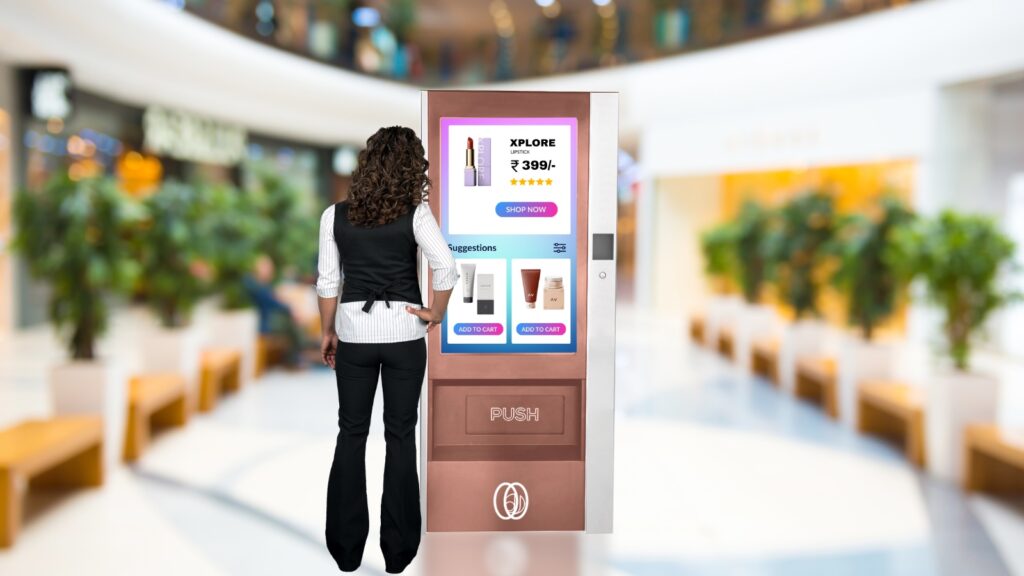Valued at USD 12.29 billion in 2024, the vending machine market is projected to grow at 10.6% CAGR to touch USD 26.79 billion by 2032. Once synonymous with simple snack, pop, and gum dispensing, these convenience-based devices have undergone dramatic transformations ushering in an era of AI vending machines that can dispense anything from smartphones and accessories to beauty products, sports goods, and more.
The rise of AI retail solutions is redefining business models and customer relationships, seamlessly integrating RFID, IoT, weight sensors, camera analytics, payment systems, and real-time tracking to create a smarter, more intuitive shopping experience. These technologies work in harmony to deliver personalized recommendations, frictionless payments, and real-time insights, enhancing customer engagement while cutting costs, optimizing inventory, and streamlining operations like never before.
Ever wondered what makes smart vending machines so game-changing? In this blog, we will dive into their top features and the benefits of AI-powered vending machines that are transforming the way we shop, sell, and experience retail.
Why AI-Powered Vending Machines Are the Future of Retail
Did you know that the United States alone has over 7 million vending machines, the highest among all countries, which roughly translates to 1 vending unit per 50 American residents?

AI is rapidly transforming retail, creating smarter, more personalized shopping experiences. Businesses can now dig deeper into customer behavior through digitized interactions and hyper-personalized recommendations based on purchase and search history.
With interactive chat, voice assistance and virtual try-ons, intelligent vending technology goes beyond traditional vending to deliver a seamless and engaging customer experience. These machines don’t just sell products, they create stronger customer-to-brand connections, driving loyalty and consistent CLV growth.
Key Features of AI-Powered Vending Machines
What distinguishes an AI vending machine from an ordinary pop dispenser? The difference lies in advanced features that include:

- Personalized Customer Recommendations – Vending Systems That Know You
Imagine a vending machine that knows your preferences! AI vending machines utilize customer data, such as purchase history, time of day, and even weather conditions to suggest personalized product recommendations. For example, a smart vending machine might suggest a hydrating serum in the morning for a fresh start or a frizz-control hair mist on a humid day, giving customers exactly what they need when they need it. This personalized approach is one of key ways how AI vending machines enhance customer experience, increasing the likelihood of impulse purchases.
- Interactive Customer Interfaces – The ‘Human Touch’ With Intuitive Assistance
Using intuitive user interfaces, such as touchscreens and voice assistants, AI-powered vending machines make the purchase process simple and enjoyable. Digitized interfaces enable customers to easily browse catalogs, view product information, and even customize their orders with a few taps on the screen. Overall customer experience soars with these features and eventually encourages repeat purchases.
- Seamless Payment Integration – No More Coins
AI vending machines seamlessly integrate with various cashless payment methods, including credit cards, debit cards, mobile wallets, UPI, and even loyalty programs, gift vouchers, and discount coupons. While this is a massive leap forward in driving sales through quick and hassle-free payments, it also improves security by reducing the risk of transactional fraud.
- Advanced Inventory Management – Track / Manage Inventory In Real-Time
Smart vending machines are equipped with sensors and cameras that monitor stock levels, identify low stock situations, and automatically trigger replenishment orders. This ensures that the machines are always stocked with popular items, minimizing the risk of stock-outs and maximizing sales opportunities.
- Remote Monitoring and Maintenance – Bird’s Eye Visibility
A game changer in AI retail solutions, remote monitoring capabilities in AI vending machines allow retailers to track machine performance, identify maintenance issues and proactively address potential problems. This proactive approach minimizes downtime, reduces maintenance costs and ensures that the machines are always operating at peak efficiency without the need for physical routine checks.
- Advanced Security – Fraud Detection And Prevention
Intelligent vending technology is often exposed to serious vulnerabilities like theft, transactional fraud, data breaches, malware infections, and vandalism. Besides financial losses, these threats can lead to legal liabilities, reputational damage, and loss of customers’ trust. Smart security features like superior encryption techniques for data protection, remote monitoring, real-time anomaly detection, biometric authentication, alarm systems, and CCTV surveillance can counter security breaches successfully.
Benefits of AI-Powered Vending Machines for Retailers and Consumers
Over the years, AI vending machines have worked wonders for retailers and consumers in multiple avenues of operational advantage and customer satisfaction.

For vendors, AI retail solutions bring in a medley of benefits that include:
- Enhanced Operational Efficiency with
- Streamlined Inventory Management: Real-time tracking that minimizes stock-outs and maximizes sales.
- Reduced Labor Costs: Automated replenishment and maintenance that reduce the need for manual intervention.
- Valuable Customer Insights: Data analysis that drives successful business decisions with insights into customer behavior and preferences.
- Increased Revenue and Profitability with
- Enhanced impulse purchases and increased average transaction value through personalized recommendations.
- Steadily growing customer reach and enhanced revenue generation beyond traditional store hours, with 24/7 availability.
- Reduced inventory holding costs with minimized spoilage.
For consumers, the benefits of AI-powered vending machines include convenience and personalization such as:
- 24/7 Access: Purchasing products at any time, day or night, from convenient locations.
- Personalized Recommendations: Discovering new products and receiving tailored offers.
- Seamless & Cashless Payment Options: Enjoy quick and secure transactions with various cashless methods.
- Improved Accessibility: Accessing products in locations where traditional stores may not be feasible.
Summing up, for retailers, intelligent vending technology helps improve operational efficiency by optimizing inventory management, reducing labor costs, and providing valuable customer insights. For consumers, they offer unparalleled convenience and personalization, providing access to a wide range of products 24/7 and delivering tailored recommendations.
Real-Life Examples of AI Vending Machines
The future of AI-powered vending machines is here and leading companies are taking charge. Let’s explore how top brands are already cashing in on intelligent vending technology:
- L’Oréal’s AR-powered vending machines: Featuring augmented reality (AR) mirrors that let customers virtually try on makeup before purchasing.
- Amazon Go: Utilizes computer vision and sensor fusion to enable cashier-less vending experiences, offering seamless shopping journeys.
- Sephora’s Live 3D Facial Recognition: Enhances product recommendations, boosting conversions—proving that smart vending is the future of beauty retail.
- Nestlé: Deploys AI vending machines in office buildings and campuses, offering snacks and beverages with personal recommendations and loyalty programs.
AI Vending Machines – Challenges and Future Scope
While AI-powered vending machines offer numerous advantages, they also present certain challenges. Some hurdles that presently impede widespread adoption include:
- High Initial Investment Costs: Significant entry barriers for some businesses.
- Technical Issues: Connectivity problems, software glitches, and maintenance requirements.
- Data Security and Privacy Concerns: Ensuring secure collection and use of customer data.
- Technology Obsolescence: Frequent upgrades, hardware changes, and training can drain resources.
Even with these hurdles, the future of AI vending machines is bright with advancements like:
- Predictive Analytics: To anticipate future demand and optimize inventory.
- Personalized Promotions: Delivering targeted offers based on individual preferences.
- Emotional AI: Detecting customer mood and offering appropriate product suggestions.
- Integration with IoT: Connecting with other smart devices for more integrated experiences.
- Reverse Vending Machines: Supporting sustainability with waste-reducing inventory.
- Subscription Model Vending: Encouraging repeat purchases.
- Age Verification Systems: Verifying IDs for restricted products like liquor or medicines.
Final Thoughts
From coin-operated Holy Water dispensers in 1st century Roman Egypt to Xiaomi’s smartphone-dispensing kiosks, AI powered vending machines have come a long way to meet customer expectations and business goals.
At present, AI-powered vending machines are transforming the retail landscape with features such as real-time inventory management, personalized recommendations, and seamless payment integration. These intelligent AI retail solutions maximize customer experience, improve operational efficiency, reduce costs, and provide valuable insights for retailers. As AI continues to evolve, we can expect sweeping innovations that will redefine our interaction with brands and the way we shop.

